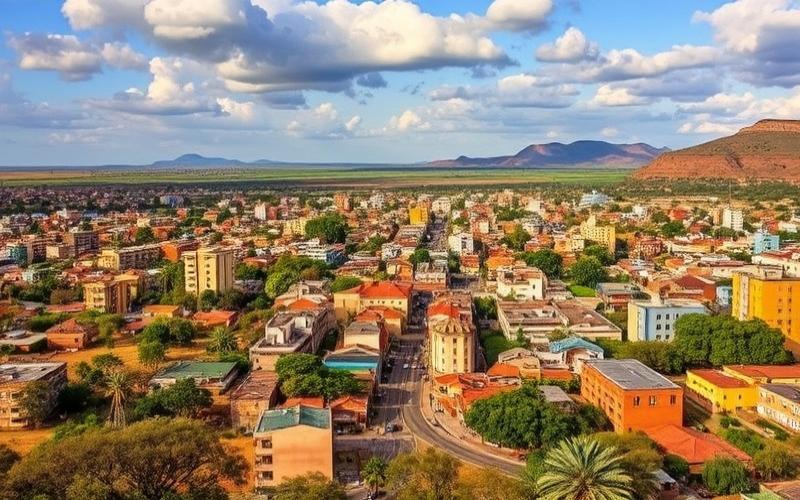
 Published on and written by Cyril Jarnias
Published on and written by Cyril Jarnias
South Africa, with its cultural richness and thriving educational heritage, is attracting an increasing number of international students eager to benefit from a dynamic and diverse academic experience.
Exploring a range of scholarships offered by various institutions and organizations, students can find opportunities to fund their studies in this vibrant country.
Additionally, the housing issue, often crucial for students far from home, is addressed with various options ranging from university residences to private accommodations, allowing students to fully immerse themselves in South African life.
This article aims to detail these essential aspects for any student considering moving to the country, providing practical and up-to-date information to navigate this crucial chapter of their academic journey.
International Student Guide: Studying in South Africa
Scholarships for International Students in South Africa
The main scholarships available to foreign students wishing to study in South Africa are offered by universities, private foundations, and certain international programs:
| Organization/Institution | Scholarship Type | Eligibility Criteria | Application Process |
|---|---|---|---|
| Mandela Rhodes Foundation | Master’s & Specialization | Excellent academic results, leadership, under 30 years old, African citizen or permanent African resident | Online application with recommendation letters and supporting documents |
| Mastercard Foundation Scholars Program | Undergraduate & Master’s | Academic talent from disadvantaged backgrounds primarily in Africa | Application through partner universities (e.g., UCT, Wits) |
| Canon Collins Trust | Postgraduate | Strong academic results, Southern African countries | Application on the Trust’s website |
| Commonwealth Scholarships | Master’s | Citizens/refugees in a Commonwealth country outside South Africa | Application via official platforms |
| University-specific scholarships (UJ, Pretoria…) | All levels | Academic excellence/financial need depending on institution | Direct contact with each university |
Practical tip: It is recommended to check the website of your target university directly to learn about specific scholarships available and their deadlines.
Accommodation Options for International Students
- University residences
- Private rental (apartment or studio)
- Shared housing
Comparative list of accommodation types:
| Type | Advantages | Disadvantages |
|---|---|---|
| University residence | Campus proximity Security | Limited spaces Strict regulations |
| Private rental | Independence Flexible choice | High deposit/guarantee Full responsibility |
| Shared housing | Shared cost Enriched social life | Compatibility with roommates necessary |
Practical Tips for Finding Accommodation
- Start searching as soon as you receive an acceptance letter.
- Check dedicated South African student housing Facebook groups.
- Use specialized local platforms (e.g., Private Property).
- Prioritize proximity to campus to limit transportation costs.
- Always visit the accommodation before signing and request a written contract.
Average Monthly Student Cost in Major South African Cities
Estimate excluding university fees:
| Shared/University Housing | Food | Local Transportation | Miscellaneous | |
|---|---|---|---|---|
| Cape Town | 5000–8000 ZAR | 2000–3000 ZAR | 600–1000 ZAR | 1000–2000 ZAR |
| Johannesburg | 4500–7000 ZAR | 1800–2500 ZAR | 500–900 ZAR | ~1500 ZAR |
| Pretoria | 4000–6500 ZAR | ~1700—2300 ZAR | ~500—800 ZAR | ~1200 ZAR |
Key Tips for Cultural and Social Adaptation
- Actively participate in international or sports student associations upon arrival.
- Respect linguistic and cultural diversity; ask questions if you don’t understand a local custom.
- Adopt an open attitude towards the prevalent religious and ethnic diversity.
- Learn about urban safety: avoid certain risky neighborhoods after dark.
Taking part in local events will help you expand your social network while quickly discovering the South African academic environment.
Good to know:
To maximize your chances of obtaining a scholarship in South Africa, explore programs offered by the NRF and DAAD, and prepare for annual housing costs ranging from 4,000 to 7,000 euros depending on the city and type of accommodation.
Available Student Scholarships for South Africa
Student scholarships in South Africa are diverse and target both South African and international students, with a particular focus on academic excellence, leadership, and the desire to contribute to the continent’s development.
Main Types of Available Scholarships
| Scholarship Type | Target Audience | Fields of Study | Institutions/Organizations |
|---|---|---|---|
| Excellence Scholarships | National & International | All fields (excluding MBA, sometimes) | Universities, foundations |
| Leadership Scholarships | Africans, emerging leaders | Generally all fields | Mandela Rhodes Foundation |
| Field-specific Scholarships | All eligible profiles | Science, engineering, health, etc. | Universities, research centers |
| Mastercard Foundation Scholarships | Disadvantaged Africans | Primarily STEM, leadership | Mastercard Foundation, partner universities |
| Mobility Scholarships | International | All fields | Canon Collins Trust, DAAD, etc. |
Specific Examples of Renowned Scholarships
Mandela Rhodes Scholarship
- Eligibility Criteria: Be aged 19 to 29, have strong academic results (grades > 70%), demonstrate leadership potential, be a citizen of an African country.
- Fields Covered: Master’s and specialization, excluding MBA, at any South African university.
- Benefits: Full coverage of tuition and living expenses.
- Institution: Mandela Rhodes Foundation.
Mastercard Foundation Scholars Program (MCFSP) at University of Pretoria
- Eligibility Criteria: Talented young Africans from disadvantaged backgrounds, prior university admission.
- Fields Covered: Undergraduate, Honours, Master’s.
- Benefits: Full scholarship (tuition, housing, meals, materials, stipend, insurance, transportation, visa, support).
- Obligation: Return to home country after studies and community engagement.
- Institution: University of Pretoria in partnership with Mastercard Foundation.
African STARS MSc Fellowship
- Eligibility Criteria: Born or residing in Africa, under 35 years old, holder of a BSc Honours (NQF level 8).
- Fields Covered: Bioinformatics, infectious diseases, genomics.
- Benefits: Full funding for a Master’s at Stellenbosch University.
- Institutions: CERI (Stellenbosch University), Institut Pasteur de Dakar, Mastercard Foundation.
Canon Collins Trust Scholarships
- Eligibility Criteria: African students for master’s or doctoral studies in priority disciplines.
- Fields Covered: Primarily law, social justice, education, health.
- Benefits: Between 20,000 and 100,000 rand depending on study level.
- Institution: Canon Collins Educational & Legal Assistance Trust.
General Eligibility Criteria
- Excellent academic results (often > 70% or equivalent)
- Proof of leadership or community engagement
- Age limit (generally under 35 for master’s)
- Prior admission to a South African university
- For some scholarships, African nationality required
Fields of Study Covered
- Science, technology, engineering, mathematics (STEM)
- Humanities and social sciences
- Law, health, education
- Sometimes excludes MBA or accelerated programs
Impact of Scholarships on Student Life
- Increased accessibility to higher education for students from disadvantaged backgrounds
- Strengthening pan-African networks and leadership development
- Academic and professional support (mentoring, internships, leadership training)
- International mobility and beneficial experience return for home communities
- Reduced financial stress through full or partial coverage of living and study costs
Recent Trends
- Increase in scholarships targeting young African leaders and STEM fields
- Growing collaboration between South African universities and international organizations (Mastercard Foundation, Canon Collins, DAAD)
- Focus on social impact and community return after studies
- Digitalization of application and selection procedures
Testimonials from Scholarship Recipients
“Thanks to the Mandela Rhodes Scholarship, I was able to fully dedicate myself to my studies and develop leadership skills that transformed my professional vision. The alumni network still supports me in my journey today.”
“The MCF scholarship at Pretoria allowed me to access quality training, discover South Africa, and build connections with students from across the continent. I am now engaged in a development project in my home country.”
Key Takeaways
Student scholarships in South Africa are a major lever for access to higher education, the emergence of young leaders, and the socio-economic transformation of the continent.
Their impact goes beyond funding, promoting engagement, mobility, and innovation.
Good to know:
Scholarships from the South African Department of Education for local students often cover tuition and accommodation, while the Mandela Rhodes Scholarship is open to African students with a focus on leadership and reconciliation. Check South African university websites to discover specific scholarships offered directly by each institution.
Finding Student Housing in South Africa
Types of Student Housing Available in South Africa:
- University residences:
- Generally located in immediate proximity to campuses.
- Offer single or shared rooms, often furnished and sometimes with a meal plan included.
- The atmosphere promotes community life, intercultural exchanges, and rapid integration.
- Shared apartments (shared housing):
- Highly sought after for their flexibility and moderate cost.
- Allow living with other South African or international students, often in vibrant neighborhoods near universities or downtown.
- Private accommodations (studios/independent apartments):
- Offer more privacy and independence.
- Suited for students seeking quiet or greater autonomy.
Major University Cities and Local Options:
| City | Major Universities | Housing Options | Local Particularities |
|---|---|---|---|
| Johannesburg | University of the Witwatersrand, UJ | On-campus residences, shared housing | Nearby neighborhoods to prioritize for safety |
| Cape Town | University of Cape Town | Private/university residences, shared housing | High demand: frequent waiting lists |
| Pretoria | University of Pretoria | Modern student residences | Relatively high cost in city center |
| Durban | University of KwaZulu-Natal | Affordable shared housing | Friendly atmosphere near campus |
Average Costs by Housing Type:
- Single room in university residence: 46,000–60,000 ZAR/year
- Shared double room in university dormitory: ≈43,000 ZAR/year
- Shared apartment/shared housing in Cape Town or Johannesburg: from 4,500 to 8,500 ZAR/month per person (depending on neighborhood)
- Private accommodation/independent studio: generally more expensive (7,000–12,000 ZAR/month)
Money-saving tips:
- Prioritize shared housing
- Choose accommodation further out but well-served by transportation
- Book early to benefit from the best rates
Administrative Steps & Timelines:
Indicative list:
- Start searching upon receiving university admission
- Submit an application to the student housing service OR register via recommended private platforms
- Allow between 2 weeks and several months depending on type chosen (public residences are in high demand)
Frequently required documents:
- University acceptance letter
- ID/passport
- Financial guarantee/security deposit
Reliable Platforms for Finding Secure Student Housing:
Recommended list:
- Student.com
- Property24.com
- StudentAccommodationCapeTown.com
- ResPublica.co.za
Also consider checking official university-related Facebook groups and “accommodation” pages on their institutional websites.
Community Aspects in Some Student Residences:
Key features:
Some residences offer equipped common areas (shared kitchens, TV rooms), regularly organize social activities, sports/cultural clubs, and provide specific support for newcomers. This facilitates social integration while enabling intercultural discovery.
Testimonials & Practical Tips from Student Experiences:
“Shared housing not only allowed me to reduce my expenses but also quickly build a local social circle.”
“I booked my room on StudentAccommodationCapeTown.com three months before my arrival. This saved me a lot of stress—but beware of scams on some unverified sites.”
Key advice:
Always physically visit your future accommodation if possible or request a reliable virtual tour; be wary of offers that seem too good to be true; ensure the neighborhood is safe especially in large cities like Johannesburg.
Finding student housing in South Africa requires anticipation, vigilance regarding safety, exclusive use of recognized platforms… but it’s also the perfect opportunity to immerse yourself in a dynamic international student life!
Good to know:
In Johannesburg, Cape Town, Pretoria, and Durban, university residences offer an economical option with shared facilities, while shared apartments or private accommodations may cost more; it is advisable to consult the South African Student Accommodation Association for reliable options and plan booking several months in advance.
Disclaimer: The information provided on this website is for informational purposes only and does not constitute financial, legal, or professional advice. We encourage you to consult qualified experts before making any investment, real estate, or expatriation decisions. Although we strive to maintain up-to-date and accurate information, we do not guarantee the completeness, accuracy, or timeliness of the proposed content. As investment and expatriation involve risks, we disclaim any liability for potential losses or damages arising from the use of this site. Your use of this site confirms your acceptance of these terms and your understanding of the associated risks.
























































